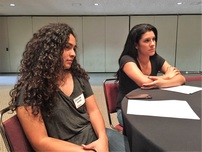
October 2, 2016
I get mistaken for a college student a lot. My passive solution to this is to keep a very basic, traditional wardrobe. So, when I was invited Wednesday to participate in a speed mentoring event at Cal-State Northridge, I felt confident my navy trousers, plain white top and brown leather bag would communicate "adultness."
"Hi. What's your name," asked the woman at the check-in table. I answered. She asked if I registered for the event because I wasn't on the list.
I could feel the heat of embarrassment rising in my neck. Had I arrived too late? (There's some adulting for you.) Maybe they were unimpressed with my work, dropped me and hoped I wouldn't show. I started to mumble about some email invite I got a few weeks ago but then, the nice CSUN student who escorted me from the parking garage to the student center, saved me: "No, no," she said. "She's a mentor. A professional journalist."
The woman apologized. "I'm sorry," she said. "You look young." I smiled defeated. So much for the basic wardrobe trick.
After that, I started to question what wisdom could I impart. These college journalists were probably social media stars. Millennial go-getters with video skills I envied.
I walked into the ballroom, anyway. (Technically, I shoved a cookie in my mouth first, then walked in.)
For three hours, I answered all their questions, even ones I didn't know I had answers to!
About 65 CSUN journalism students attended. I probably met a dozen of them. It was good fun. I realized I knew a lot more about online/digital reporting that I thought. However, the most important lesson I took home -- and hopefully, so did the students -- was that the fundamentals of reporting are your foundation.
Tell a story with characters and conflict, with research and confirmed facts, with curiosity and good writing. It doesn't matter if it's on social media, TV or in a newspaper; solid reporting and good storytelling are at the heart of all journalism platforms.
Oh, and I learned that basic clothing doesn't make you look older. But you'll always match.
I get mistaken for a college student a lot. My passive solution to this is to keep a very basic, traditional wardrobe. So, when I was invited Wednesday to participate in a speed mentoring event at Cal-State Northridge, I felt confident my navy trousers, plain white top and brown leather bag would communicate "adultness."
"Hi. What's your name," asked the woman at the check-in table. I answered. She asked if I registered for the event because I wasn't on the list.
I could feel the heat of embarrassment rising in my neck. Had I arrived too late? (There's some adulting for you.) Maybe they were unimpressed with my work, dropped me and hoped I wouldn't show. I started to mumble about some email invite I got a few weeks ago but then, the nice CSUN student who escorted me from the parking garage to the student center, saved me: "No, no," she said. "She's a mentor. A professional journalist."
The woman apologized. "I'm sorry," she said. "You look young." I smiled defeated. So much for the basic wardrobe trick.
After that, I started to question what wisdom could I impart. These college journalists were probably social media stars. Millennial go-getters with video skills I envied.
I walked into the ballroom, anyway. (Technically, I shoved a cookie in my mouth first, then walked in.)
For three hours, I answered all their questions, even ones I didn't know I had answers to!
- How did you get to where you are?
- What if a source doesn't respond to your request for comment?
- How important is social media?
- Do you really have to brand yourself?
- Is writing important for broadcast?
- What is beat reporting? How do you do it?
- Can you look at my resume?
About 65 CSUN journalism students attended. I probably met a dozen of them. It was good fun. I realized I knew a lot more about online/digital reporting that I thought. However, the most important lesson I took home -- and hopefully, so did the students -- was that the fundamentals of reporting are your foundation.
Tell a story with characters and conflict, with research and confirmed facts, with curiosity and good writing. It doesn't matter if it's on social media, TV or in a newspaper; solid reporting and good storytelling are at the heart of all journalism platforms.
Oh, and I learned that basic clothing doesn't make you look older. But you'll always match.
 RSS Feed
RSS Feed